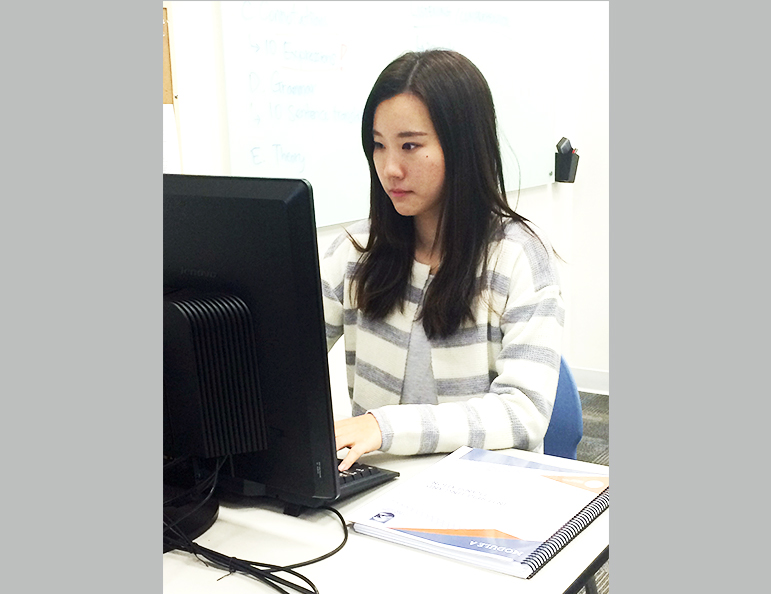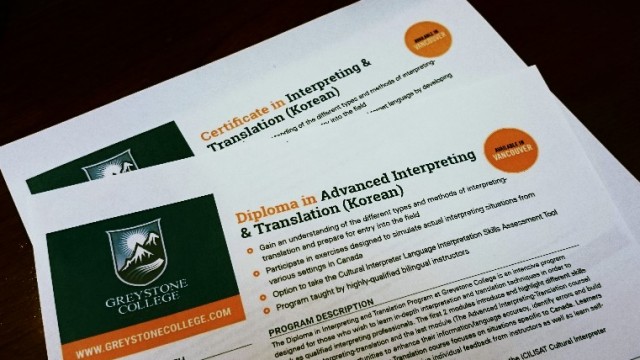Sophie Kim is an instructor in Greystone College’s Interpreting and Translation (Korean) program. Sophie was born in Korea but has spent her childhood in several countries including England, Thailand and Canada. She completed her undergraduate degree in Psychology at UBC. After graduation, Sophie started working as an ESL instructor in Vancouver, which led her to work in the specific field of interpreting and translation education for five years.
Sophie sat down with us recently to discuss the interpreting and translation industry, and share her insight for students considering a career in the field.
How did you get into the translation/interpreting industry?
In order to explain what led me to this industry, it’s essential to briefly discuss my childhood. Although I was born in Korea, I was fortunate enough to learn English at a very young age. When I was six, my family moved to England and while keeping up with my first language, I was able to pick up English almost instantly. My family then moved to Thailand, where I was able to continue using English at an international school. After a few years, we ended up in Vancouver, Canada.
Travelling to all these different countries, I was able to experience different languages and cultures which ultimately led me to have a great passion for studying them. Through the years, I had numerous opportunities to meet other Koreans and teach them English, interpret and translate for them, such as volunteering as a community interpreter and translator for Korean immigrants who have language barriers, interpreting sermons at church services and the list goes on. Basically, translating and Interpreting was something I did every day for family and friends around me.
Having a passion for teaching and the privilege of being bilingual, it was natural for me to step into this role and career.
What do you like the most about your job?
First of all, I would not have been in this industry at all if I had not enjoyed teaching! I love connecting with students who come from all sorts of backgrounds, in different stages in life, and I hope to inspire students with the knowledge I can share. It’s definitely a very rewarding feeling at the end of the day when you know students are putting in their best effort to develop and that I was a part of their motivation.
I also love that I can use my mother language, Korean, as a tool for teaching. Languages are complex and the deeper I get into the interpreting/translation field, the more I feel every language has its own uniqueness and color. And the reason for this is Culture. It’s undeniable that culture is embedded in language. Some words or expressions in Korean can never be translated into English without losing its unique tone and color. Same goes for many English words as well. I found this fascinating.
I feel privileged to be able to discuss these with my students and also learn what perspectives they have toward translation/interpreting. Other than that, just listening to some out of the ordinary translations from my students and being able to fix their “Konglish” is always fun.
What was the best career advice you received?
A mentor of mine who has been in this industry for some time once told me “always put myself in the speaker’s shoes before anything”. Sometimes, it’s really hard to know what the speaker is trying to say or what specific meaning the writer is trying to deliver. Being a translator or an interpreter is almost like being a mediator. For example, if you are interpreting and do not understand exactly what the speaker is meaning, your translation can lose its course and that could lead to a number of problems.
My mentor told me that translating/interpreting can become much easier once I put myself in their shoes. Imagine that I am the victim or the lawyer. What message would they want to deliver? Rather than being confined to the role of an interpreter/translator, I always try to look at the situation from their perspectives first. This has always helped me to empathize with each speaker and by doing so led me to interpret/translate (or deliver the message) accurately.
What advice would you give to students pursuing a career in the translation/interpreting industry?
I always like to encourage my students to remember that language is a “skill”. Sometimes, I see so many students or fellow translator/interpreters who are stuck in the “knowledge” of language. Having the knowledge of a certain language, such as being able to master a grammar book, can only get you so far.
It’s just like learning a new musical instrument. You may know how to play the guitar by studying the chords from a book but you can never call yourself a great guitarist until you are able to actually “play” it well. Like this example, “knowing how” is not always the answer to improving. Students who plan to work bilingually or pursue a career in the translation/interpreting field need to remember that they need to go out there and do hands-on PRACTICE.
Expose yourself to different texts, different people, different settings and situations. Learn how people communicate and practice interpreting, translating or whatever skill you wish to develop. I’m sure all teachers tell their students that practice makes perfect, but I don’t think there is any better advice, especially when it comes to learning the skills of language.
Would you like to know more about the interpreting/translation programs?
https://www.greystonecollege.com/certificate-in-interpreting-translation-korean




